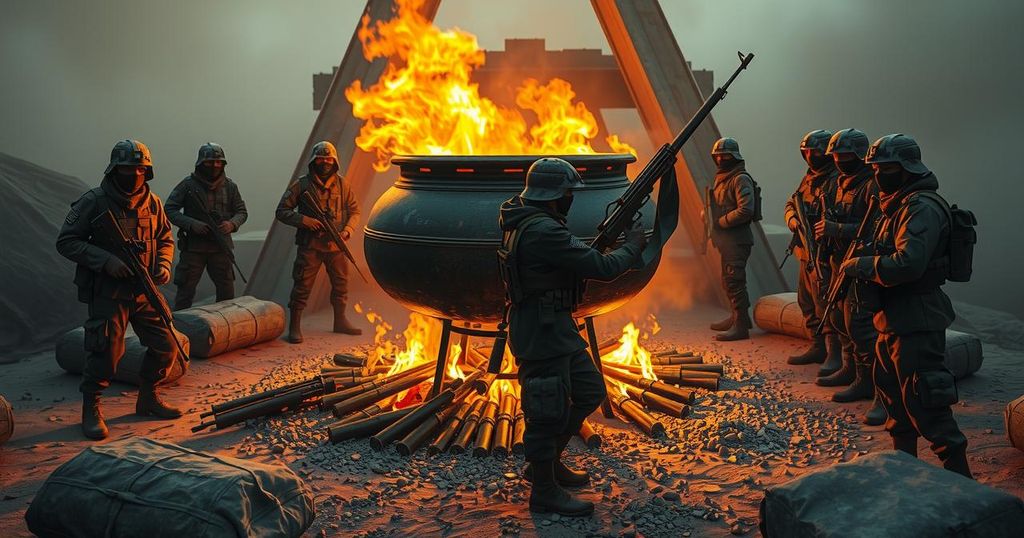What to Know About the Latest Effort to End Turkey’s Kurdish Conflict
- A group of 30 PKK fighters publicly burned their weapons to symbolize the start of disarmament.
- Abdullah Ocalan has pushed for disarmament in a bid to end the Kurdish conflict.
- Devlet Bahceli’s suggestion for Ocalan’s parole marks a shift in Turkish politics.
- Past peace attempts have repeatedly failed amid ongoing violence in the region.
- Turkey’s current peace effort is influenced by broader Middle East dynamics.
Transitioning From Violence to Potential Peace in Turkey
The recent initiative to end Turkey’s Kurdish conflict highlights a pivotal moment for both the state and the PKK. Recently, in northern Iraq, a group of 30 fighters from the Kurdistan Workers’ Party, known as PKK, ceremonially burned their weapons as a step toward disarming. This act represents a significant gesture marking the transition from decades of violence to potential peaceful negotiation, underpinned by calls from PKK leader Abdullah Ocalan for the group to disarm and cease operations. He conveyed this message yet again through a video this week, reiterating the need for change after years of conflict.
Understanding the PKK and Its Historical Context
The Kurdish conflict, which has grown into a complex and devastating struggle spanning four decades and several national borders, has considerably shaped current dynamics in Turkey, Iraq, and beyond. Founded in 1978, the PKK sought initially to establish a Kurdish state, but over time the focus shifted toward seeking autonomy and rights within Turkey. Throughout this turmoil, tens of thousands have died, and the PKK itself remains classified as a terrorist organization by Turkey, the United States, and the European Union. Abdullah Ocalan’s imprisonment has turned him into a symbolic figure within the Kurdish movement, allowing him to exert influence even from behind bars. His calls for cooperation signal a potential avenue for resolving one of the most persistent conflicts in the region.
Challenges in Achieving Lasting Peace
October marked the start of a new dialogue when Devlet Bahceli, a leading Turkish political figure, indicated a willingness for change. Bahceli’s surprising suggestion that Ocalan could receive parole contingent on the PKK’s disbanding signifies a notable shift for a politician typically resistant to any form of negotiation regarding Kurdish rights. Following this, Ocalan’s appeal for the PKK to disarm was met with a unilateral ceasefire announcement in March, raising questions about the future political integration of former Kurdish fighters. Despite initial progress, concerns loom over the possibility of splinter groups forming and resumed attacks. The recent attack attributed to the PKK on a Turkish aerospace company underscores the complexity of this evolving situation and the challenges ahead. Turmoil may still undermine trust, as historical precedents reveal a wavering commitment to peace in this fraught landscape.
Regional Dynamics and Future Implications
The backdrop for this renewed effort is pertinent, given ongoing seismic shifts altering the political environment throughout the Middle East. In light of Assad’s weakening regime in Syria, alongside the degradation of Hezbollah’s influence in Lebanon, the regional landscape appears ripe for negotiation. Specifically, Turkey’s support for a deal involving the U.S.-backed Kurdish-led Syrian Democratic Forces points toward changing allegiances that could affect both parties involved in this complex web of conflict. Analysts like Hamish Kinnear suggest that Ocalan’s recent moves toward disarmament arise from diminished PKK leverage amidst unfavorable conditions. Understandably, the motivations for this peace push might not solely focus on the empowerment of Kurdish rights but could also strategically serve Erdogan’s government, as there are speculations about gaining Kurdish backing for a new constitution that may extend his political tenure beyond 2028.
The ceremonial disarmament of PKK fighters represents a significant milestone in the long-standing Kurdish conflict in Turkey. Influential Kurdish leader Abdullah Ocalan’s calls for disarmament have set a precedent, although real challenges remain as many uncertainties linger about the political landscape and the trajectory of peace efforts. The prospects of achieving lasting peace will hinge not only on the resolutions reached but also on the broader implications and reactions from various factions within and outside the PKK.




Post Comment